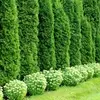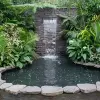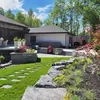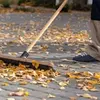Why use geotextile in your landscaping?
- Date : Tuesday, July 11th, 2023
- Read time : 4 min
Before starting a landscaping project, it's essential to consider all the elements that will guarantee stability and optimize long-term durability. Did you know that one of the keys to success is the use of geotextile? Geotextile offers many advantages in landscaping, and for a number of reasons, it has become an essential element for professionals in the field.
Roles and benefits of geotextiles
Erosion control
If a property has a steep slope, sloping areas or is exposed to water level variations, the soil can easily fall victim to erosion. This erosion then becomes the cause of damage to your landscaping. Geotextiles play a crucial role in erosion control. When properly installed, it creates a physical barrier, holding the soil in place and reducing the risk of erosion caused by water or wind. The use of geotextile on slopes, embankments or banks helps preserve the integrity of the landscape by preventing soil degradation.
Separating materials
In landscaping, the use of different types of material is very common. Geotextiles are used to separate sand, gravel and soil, preventing them from mixing. The addition of a membrane creates a barrier between the different layers, making it easier to maintain the materials and their long-term stability.
Drain the soil
In some cases, good drainage is essential for plant health and landscape stability. Geotextiles can be used to improve drainage by allowing water to flow freely through the soil. Some types of geotextile are designed to allow water to pass through while retaining soil particles. This prevents the build-up of stagnant water, prevents waterlogging problems and promotes a healthy root environment for plants.
Reduce weeds
Weeds can quickly invade landscaping, causing aesthetic and maintenance problems. The use of geotextile can help reduce weed growth. When placed under a layer of mulch or stone, geotextile blocks sunlight, preventing weeds from germinating and spreading. This greatly reduces the need for regular weeding, helping to maintain a clean, attractive landscape.
Geotextile varieties
There are several varieties of geotextile, each with its own characteristics and uses. The best-known are non-woven and woven geotextiles.
Visitnon-woven geotextile is certainly the most common type. It is made from synthetic or natural fibers, randomly arranged and mechanically or chemically bonded. Non-woven geotextiles are used for erosion control, material separation and drainage.
Made from interwoven synthetic yarns, thewoven geotextile is generally stronger and more durable than non-woven. It is used for material separation, soil reinforcement and slope stabilization.
There are, of course, many other varieties used for filtering, waterproofing and reinforced backfill, among other applications. But for home use, woven and non-woven geotextiles are the most suitable.
The thickness of the geotextile plays an important role in its effectiveness. The thicker it is, the more resistant it is. To choose the right geotextile, it's important to consider the type of project, the landscaping conditions, and the manufacturer's requirements and recommendations.
Whether it's to optimize the durability of your landscape or to facilitate its maintenance, geotextile is an indispensable element. When planning your next landscaping project, don't forget to include geotextile to guarantee exceptional results.





